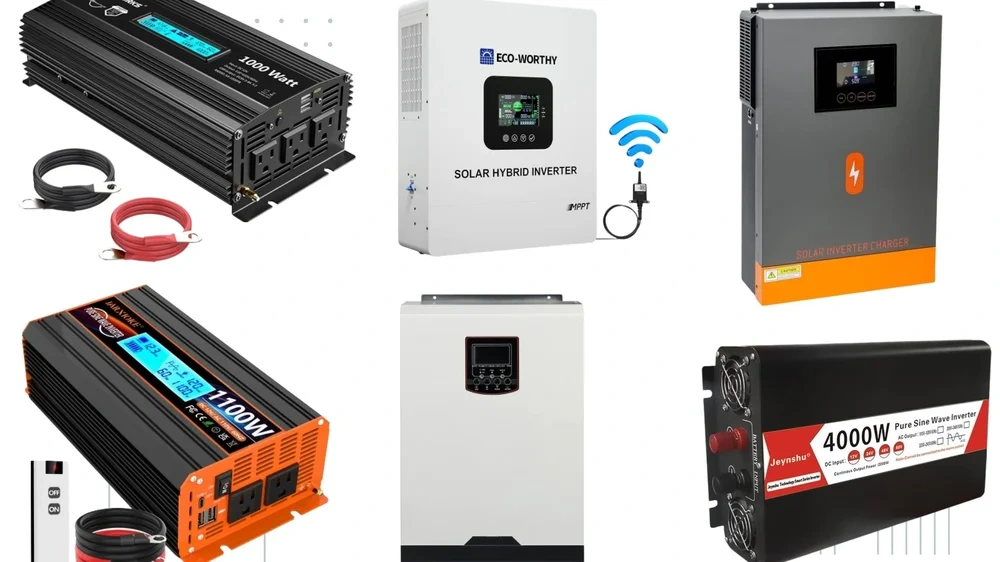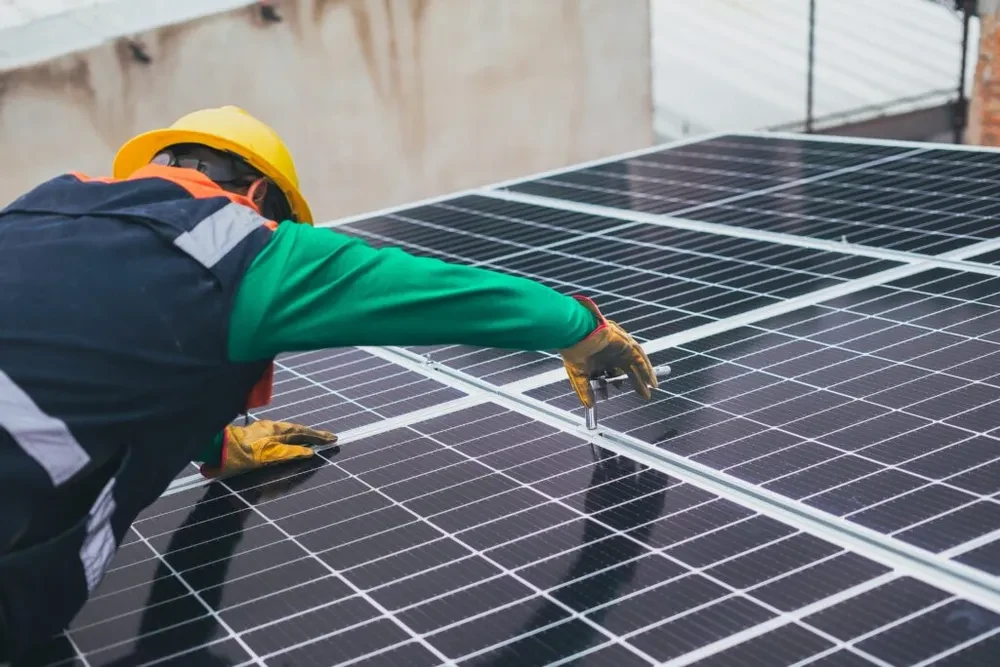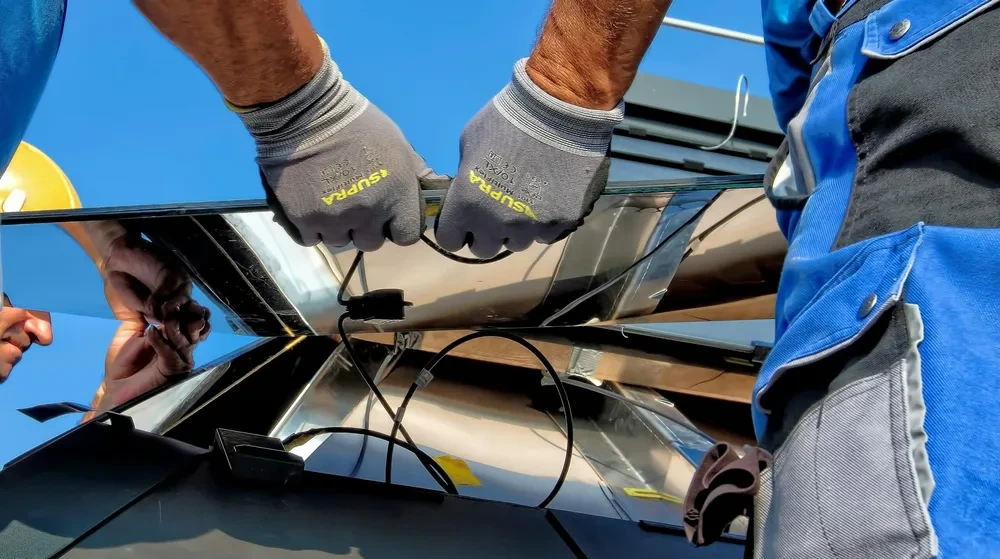The potential to significantly reduce the strain on the South African power grid could be realized through the widespread adoption of the best solar inverters for homes in South Africa. Applying this could lead to more stable and reliable electricity for its residents.
Choosing the best inverter for home use depends on the power needs of the household. Larger homes and businesses would require a higher-capacity inverter, while smaller moms may not need as much.
Buying an inverter is not only an investment toward a sustainable future but also in reducing overall electricity costs long term.
It is essential to note that inverter prices can vary greatly, depending on factors such as the type of inverter, its capacity, and the brand.
Hybrid inverters are gaining popularity in South Africa as they offer the ability to use grid power as a backup when solar energy is not available or is insufficient. This ability to switch to the best inverter for home use has drastically innovated power solutions in South Africa.
Understanding Inverters in South Africa

Unpredictable power supply in South Africa has led many homeowners to invest in hybrid inverters for efficient energy management. However, before purchasing an inverter, a homeowner needs to assess their energy requirements and budget limitations to ensure they choose wisely.
The cost of inverters in South Africa heavily ranges. The factors that could affect pricing include the type of inverter, brand, and its capacity, among others.
For instance, a standard sine wave inverter may come at a pocket-friendly price, while a high-quality hybrid inverter calls for a much bigger investment. However, the latter comes with a more efficient performance and the flexibility to switch between solar and grid power, which is very beneficial with South Africa’s recurrent power cuts.
Choosing the Best Inverter for Home Use
Before deciding on the best inverter for home use, it’s essential to consider different types of inverters, especially if you reside in regions like South Africa where solar energy is prevalent.
Pure sine wave inverters are known for their ability to smoothly convert DC power from your solar panels or battery to AC power for home use.
Hybrid inverters, on the other hand, can switch between solar and grid power, providing a more flexible and dependable source of electricity.
Choosing the right inverter for your home also depends on the size of your solar set-up. Your inverter should be able to handle the solar panel’s maximum power output to ensure that it can accommodate any potential power boost in the system.
Moreover, consider the inverter brand reliability and warranty. Purchasing from a reputable manufacturer can save you from the potential cost and inconvenience of unexpected breakdowns and malfunctions.
Key Points About Solar Inverters for Home Use
- Pure sine wave inverters can smoothly convert DC power from solar panels or batteries to AC power for home use.
- Hybrid inverters can switch between solar and grid power, providing a more flexible and dependable source of electricity.
- The size of your solar set-up determines the right inverter for your home. The inverter should be able to handle the solar panel’s maximum power output.
- Choosing a reliable inverter from a reputable manufacturer can save potential costs and inconvenience from unexpected breakdowns and malfunctions.
Solar Inverters: A Game Changer

Inverter-run appliances are more energy-efficient and a great choice for home use in South Africa.
In today’s modern world, the market is flooded with various types of inverters from different manufacturers. Some of the most popular include hybrid inverters and sine wave inverters. Both have their advantages and are best suited to specific applications.
Hybrid inverters, also known as off-grid inverters, are ideal for homes that want to be completely independent of the grid. They can switch between solar and grid power, ensuring a continuous supply of electricity and more flexibility.
Sine wave inverters, on the other hand, are known for their high-quality output, making them suitable for running sensitive electronic devices. Solar inverters are specifically designed to convert the DC power generated by solar panels into AC power that can be used in the home.
The Hybrid Inverter Revolution
Choosing the right inverter allows homeowners in South Africa to cut down on traditional energy costs and contribute to a more sustainable future. By utilizing solar energy, these devices enable homeowners to lessen their dependence on the grid, offering a more sustainable solution to constant energy consumption.
More than just a traditional inverter, a hybrid inverter integrates solar power, grid power, and battery storage in one device. This provides a seamless energy supply irrespective of weather conditions or grid-related fluctuations.
Choosing the right inverter for your home can be quite a task with multiple options available, but the rewards are undeniably worth it. Among the various choices, hybrid solar inverters stand out due to their perfect mix of functionality and affordability. These inverters not only reduce energy expenditure but also contribute to the green revolution, making them a reliable choice for today’s homes
Benefits of Hybrid Solar Inverters | Traditional Inverters
Reduces dependence on the grid | Relies on traditional energy sources
Contributes to sustainable energy consumption | Does not promote green energy
Combines solar power, grid power, and battery storage | Does not integrate multiple energy sources
Helps in reducing energy expenditure | May lead to higher energy costs
Cost of Inverters in South Africa
Solar power equipment, such as hybrid inverters and solar panels, can be costlier in South Africa than in other regions due to the added import duties and transportation costs. Inverter prices may also differ based on whether they are set up for home use or larger-scale operations, such as businesses and industrial complexes.
When it comes to buying an inverter, multiple factors aside from cost should be taken into consideration.
For instance, the type of inverter you choose should depend on the specific power requirements of your household or business. Hybrid inverters and wave inverters both have their unique advantages and are suitable for different circumstances.
When it comes to brands, South Africa boasts a wide range of inverter manufacturers, both local and international. Some of these are well-established brands known for producing reliable inverters, while others are emerging companies striving to carve out a niche in this competitive market. The right inverter brand for you would ideally combine quality, affordability, and functionality, all while meeting your needs for solar power at home.
Matching Solar Panels with the Right Inverter


The key to maximizing the output of your solar power set-up relies on determining the ideal solar inverter for residential use in South Africa. The correct inverter boosts your solar panel’s capability by efficiently converting the panels’ direct current into alternating current power which can easily be used to supply power to all essential appliances at home.
South Africa’s inverter manufacturers provide a variety of options. For instance, there’s the pure sine wave inverter known for its high-quality power output suitable for sensitive electronic devices. There is also the hybrid solar inverter, which combines grid-tie and off-grid capabilities, seamlessly integrating with the national grid and standalone batteries.
As each home or business has different energy needs, it’s crucial to understand the unique features of each type of inverter to make a practical choice.
How to Use an Inverter in Your Home
A hybrid inverter allows you to switch between solar and grid power based on your needs and power availability.
However, if you are looking to only backup power during grid outages, a traditional off-grid sine wave inverter will be sufficient. These are also designed to work with batteries or solar panels and don’t require a connection to the grid.
Keep in mind, the size of the inverter should correspond with the energy consumption of your household. The capacity of your inverter also determines how many and what types of appliances can be effectively and efficiently powered. Because of this, it is important to first assess your needs at home to know which models you must consider.
Square Wave Inverter vs. Sine Wave Inverter: A Comparison

Electronic devices at home or in a business setting rely heavily on a stable power source, and choosing an inverter for your home can help ensure that these devices continue to function optimally in case of a power outage.
When comparing off-grid models, you may come across square wave and sine wave inverters. The main difference between the two is that square wave inverters are designed to power motors, while sine wave inverters can supply power to appliances within a household.
A third and most popular type of inverter is the hybrid inverter. These allow for seamless integration of power from the grid and the solar panels simultaneously.
Choosing an inverter for your home can be a challenging task, considering the various types available and their unique features. When buying an inverter, it’s crucial to consider the capacity of the device you need, the type of power you will primarily be using, and the cost. The choice of a reliable inverter largely depends on the size and power demands of your household.
Choosing an Inverter
- Electronic devices heavily rely on a stable power source, which can be provided by an inverter.
- Hybrid inverters are gaining popularity in South Africa due to their ability to integrate solar panels with the power grid or a home backup power system.
- When choosing an inverter, it’s important to consider the capacity of the device you need, the type of power you will primarily be using, and the cost.
Why Solar Power is the Future of South Africa

There are a variety of inverter brands in the market, each offering unique features and specifications. Due to the number of options, it can make the process of selecting the best inverter and battery combination for your home backup power system a complex task.
To narrow down your choices, you must consider your home’s power needs, the type of renewable energy you plan to use, the cost, and the reliability of the inverter.
Hybrid inverters, like the ones mentioned previously, offer the flexibility of using solar or stored battery power depending on your current needs, making them a convenient and flexible option. You may also want to consider other types of inverters such as the sine wave inverter which is sufficient if you only require backup power.
Whichever one you opt for, inverters make energy consumption more efficient, affordable, and environmentally friendly since they provide homeowners with access to solar power.
Buying Guide: Inverters for Home Use
To ensure energy efficiency and reliability, it is important to understand the details of home inverters, particularly in South Africa where solar power is abundant and power outages are recurring.
A crucial factor to learn about is how an inverter transforms DC power derived from a photovoltaic solar set-up into usable AC power for residential applications. Only then will you be able to take careful consideration into aspects such as power output, capacity, and efficiency offered by each type – and if these are sufficient to power your home.
Notably, there are multiple inverter types ranging from sine wave inverters to more advanced hybrid inverters. Hybrid options effectively convert both solar or stored battery power into usable electricity, ensuring a balance between cost, photovoltaic solar and battery backup, and the transition between solar and grid electricity. These present a flexible solution, capitalizing on either solar power or stored battery power, a worthwhile consideration given the abundant solar resources in South Africa
Types of Inverters | Power Output and Efficiency | Application
Sine Wave Inverters | Varies based on model and capacity | Used in most residential and commercial applications
Solar Power Inverters | High efficiency in converting solar power to usable electricity | Used in solar power setups
Hybrid Inverters (Off-grid or On-grid) | Flexible power output, can use solar or stored battery power | Best for areas with abundant solar resources like South Africa
The Role of Inverters in Solar Energy
The demand for solar energy solutions in South Africa is on the rise, particularly for reliable inverters with increased capacity. Due to the many options available, choosing the best solar inverter for your home or business can be a daunting task.
You need to consider various factors, such as cost, efficiency, and compatibility with your existing electrical infrastructure.
Remember, the inverter is a crucial part of your solar energy system. It works by converting the DC generated by solar panels into a usable AC. Therefore, it’s important to choose an inverter that matches the capacity of your solar set-up to ensure the best performance and reliability it has to offer.
Harnessing Backup Power with Hybrid Inverters
Hybrid inverters empower consumers to switch between solar and grid electricity, providing versatile power for your home whether you currently use solar energy or want to add solar later. For individuals planning to incorporate solar power later, an inverter provides the flexibility to transition between the existing grid and the future solar power system smoothly.
The ability to transition between solar and grid power presents an efficient solution to the area’s recurrent power shortages.
Given the extensive selection of solar inverters available for purchase, the size of the inverter becomes an essential factor to consider based on the power load of your home. The energy capacity the inverter can manage should align with your inverter’s size, ensuring efficient operation and longevity of the equipment.
Hybrid Inverters
– Hybrid inverters allow for a smooth transition between grid electricity and solar power, making them ideal for those who plan to incorporate solar energy into their homes in the future.
– The ability to switch between solar and grid power can provide an efficient solution to recurrent power shortages in certain areas.
– The size of the inverter is an important factor to consider, as it should align with the power load of the home for efficient operation.
– Choosing the right size of inverter also ensures the longevity of the equipment, making it a valuable long-term investment for homeowners.




